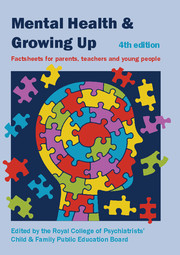Book contents
- Frontmatter
- Contents
- Contributors
- Factsheets for young people
- Factsheets for parents, carers and anyone who works with young people
- 1 Good parenting
- 2 The restless and excitable child
- 3 Dealing with tantrums
- 4 Children who soil or wet themselves
- 5 Sleep problems in childhood and adolescence
- 6 Behavioural problems and conduct disorder
- 7 Attention-deficit hyperactivity disorder (ADHD)
- 8 The child with general learning disability
- 9 Specific learning difficulties
- 10 Autism and Asperger syndrome
- 11 Depression in children
- 12 Worries and anxieties: helping children to cope
- 13 Divorce or separation of parents: the impact on children and adolescents
- 14 Death in the family: helping children to cope
- 15 The emotional cost of bullying
- 16 Traumatic stress in children
- 17 Domestic violence: its effects on children
- 18 Child abuse and neglect: the emotional effect
- 19 Drugs and alcohol: what parents need to know
- 20 Self-harm in young people
- 21 Psychosis
- 22 Schizophrenia
- 23 Bipolar disorder in children and adolescents
- 24 Obsessive–compulsive disorder in children and young people
- 25 Eating disorders in young people
- 26 Chronic physical illness: the effects on mental health
- 27 Medically unexplained physical symptoms
- 28 Chronic fatigue syndrome: helping your child get better
- 29 Parental mental illness: the problems for children
- 30 Who's who in CAMHS
8 - The child with general learning disability
from Factsheets for parents, carers and anyone who works with young people
Published online by Cambridge University Press: 02 January 2018
- Frontmatter
- Contents
- Contributors
- Factsheets for young people
- Factsheets for parents, carers and anyone who works with young people
- 1 Good parenting
- 2 The restless and excitable child
- 3 Dealing with tantrums
- 4 Children who soil or wet themselves
- 5 Sleep problems in childhood and adolescence
- 6 Behavioural problems and conduct disorder
- 7 Attention-deficit hyperactivity disorder (ADHD)
- 8 The child with general learning disability
- 9 Specific learning difficulties
- 10 Autism and Asperger syndrome
- 11 Depression in children
- 12 Worries and anxieties: helping children to cope
- 13 Divorce or separation of parents: the impact on children and adolescents
- 14 Death in the family: helping children to cope
- 15 The emotional cost of bullying
- 16 Traumatic stress in children
- 17 Domestic violence: its effects on children
- 18 Child abuse and neglect: the emotional effect
- 19 Drugs and alcohol: what parents need to know
- 20 Self-harm in young people
- 21 Psychosis
- 22 Schizophrenia
- 23 Bipolar disorder in children and adolescents
- 24 Obsessive–compulsive disorder in children and young people
- 25 Eating disorders in young people
- 26 Chronic physical illness: the effects on mental health
- 27 Medically unexplained physical symptoms
- 28 Chronic fatigue syndrome: helping your child get better
- 29 Parental mental illness: the problems for children
- 30 Who's who in CAMHS
Summary
What causes general learning disability?
In many children with general learning disability the cause of the disability remains unknown. In some there may be genetic factors, infection, brain injury or damage before birth, at birth or after. Examples include Down syndrome, fragile-X syndrome and cerebral palsy.
The effects of learning disability
Children or young people who have a general learning disability are aware of what goes on around them. However, their ability to understand and communicate may be limited, and they can find it hard to express themselves. Speech problems can make it even harder to make other people understand their feelings and needs.
They can become frustrated and upset by their own limitations. When they compare themselves with other children, they can feel sad or angry and think badly of themselves.
For a parent, it can be distressing to find out that their child has a general learning disability. It may be hard for them and other members of the family to understand why the child is like this. It can also be hard to communicate with the child, difficult to manage their behaviour and hard for other people to understand.
Brothers and sisters may be affected in a number of ways. They may feel jealous of the attention given to their brother or sister who has a disability, or they may be embarrassed by their behaviour. They may even be teased at school. Quite often, they can feel personally responsible for their disabled sibling or their distressed parent.
Learning disability and mental health
A general learning disability is not a mental illness. However, children with learning disability are more likely than other children to develop mental health problems, for example anxiety, or have additional developmental disorders, such as an autism spectrum disorder or attention-deficit hyperactivity disorder (ADHD).
What can be done to help?
Recognising difficulties in learning and development
It is important to recognise as soon as possible that a child is learning and developing slowly. It is only when the problem is recognised that the child and their family can be offered the help and support they need. The health visitor plays an important role in identifying slow development in the years before school.
- Type
- Chapter
- Information
- Mental Health and Growing UpFactsheets for Parents, Teachers and Young People, pp. 69 - 71Publisher: Royal College of PsychiatristsPrint publication year: 2013



